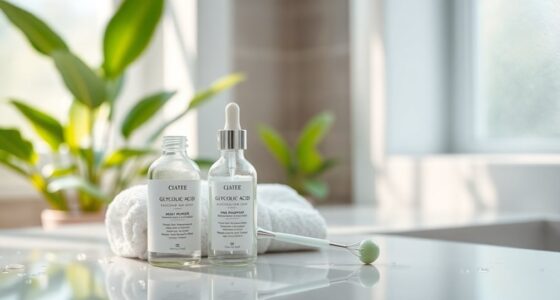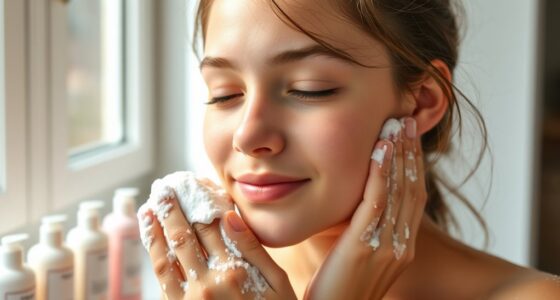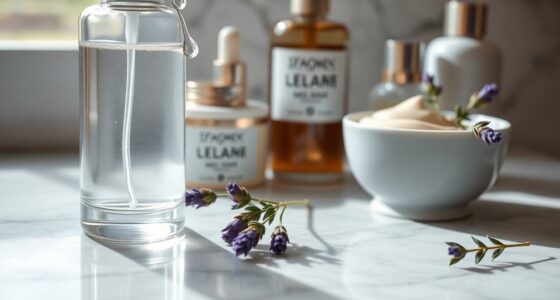To start your ultimate skincare routine, focus on the essentials: cleanse your face twice daily, tone to balance pH, moisturize to keep your skin hydrated, and apply sunscreen every morning for protection. Identify your skin type—whether it's oily, dry, combination, or sensitive—to choose the right products. Gradually add serums or treatments for specific concerns later on. Consistency is key, and there's much more to explore about enhancing your routine for a healthy glow.
Key Takeaways
- Start with a gentle cleanser to remove dirt and oil, using it twice daily for optimal results.
- Follow cleansing with a good moisturizer to hydrate and protect your skin.
- Apply broad-spectrum sunscreen every morning with at least SPF 30 to shield against UV damage.
- Identify your skin type to choose suitable products tailored to your specific needs.
- Gradually introduce additional products like serums or exfoliants after establishing your basic routine.
The Importance of a Skincare Routine

Establishing a skincare routine is vital for nurturing your skin's health and liveliness. By consistently following a regimen, you're creating a protective barrier against pollution, UV rays, and bacteria, enhancing your skin health markedly. Additionally, a proper skincare routine can serve as a form of self-care practice, promoting overall well-being and reducing stress.
A proper skincare routine can help prevent acne and address common skin concerns like dryness and wrinkles, leading to a healthier complexion. When you maintain consistency, you'll notice improvements in hydration and elasticity, essential for youthful-looking skin. Incorporating glycolic acid into your routine can significantly enhance exfoliation and promote a clearer complexion.
Targeted treatments can cater to your specific needs, boosting your overall skin integrity. Remember, it takes about 4-6 weeks to see noticeable results, so commit to your skincare routine and watch your skin transform with time and care.
Understanding Your Skin Type

To create an effective skincare routine, you need to identify your skin type first.
Knowing whether your skin is oily, dry, combination, or sensitive helps you choose products that meet your specific needs. Additionally, understanding adaptogenic properties can significantly enhance your skin's overall health and appearance. Customizing your routine based on your skin type is key to achieving the best results. Furthermore, understanding effective hydration techniques can significantly enhance your skin's overall health and appearance.
Identifying Skin Types
How can you achieve glowing skin if you don't know your skin type? Identifying your skin type is essential for selecting effective skincare products.
If you have oily skin, you might notice a shiny appearance and enlarged pores, often accompanied by acne. Using essential oils with dilution guidelines can help balance oil production without causing irritation.
On the other hand, dry skin may feel tight and look dull, sometimes flaking due to lack of moisture.
If your skin is combination, you'll see both oily areas, especially in the T-zone, and dry patches on your cheeks.
Sensitive skin can react with redness or breakouts to certain products, requiring gentle formulations.
Finally, normal skin is well-balanced, with few visible pores and a smooth texture, making it easier to maintain. Understanding your skin type can also help you select essential oils for skincare that promote hydration and balance.
Importance of Customization
Customizing your skincare routine based on your specific skin type can greatly enhance your results. Understanding your skin type and concerns—whether oily, dry, combination, or sensitive—allows you to choose products that meet your skin needs effectively.
For instance, oily skin thrives on lightweight, non-comedogenic products, while dry skin benefits from richer, hydrating formulas. If you have combination skin, a balanced approach is essential, targeting both oily and dry areas.
Sensitive skin requires gentle, fragrance-free products with soothing ingredients like chamomile or aloe vera. Additionally, incorporating nutrient-dense options such as chia seeds into your diet can support skin health from within, as chia seeds are rich sources of dietary fiber that can help promote overall health. By focusing on customized products tailored to your unique skin type, you can avoid irritation and create an effective skincare routine that truly works for you.
Customization is an essential step in achieving your desired results.
The Basic Steps of a Skincare Routine

A basic skincare routine consists of five essential steps: cleansing, toning, exfoliating, moisturizing, and applying sunscreen. Each step plays an important role in maintaining healthy skin, regardless of your skin type.
| Step | Purpose |
|---|---|
| Cleansing | Removes dirt, oil, and makeup |
| Toning | Balances pH and enhances product absorption |
| Exfoliating | Eliminates dead skin cells, improves texture |
| Moisturizing | Hydrates and locks in moisture |
| Sunscreen | Protects against sun damage and aging |
Cleansing should occur daily, with a double cleanse at night if you wear makeup. Toning prepares your skin, while exfoliating 1-2 times a week boosts effectiveness. Additionally, incorporating glycolic acid products into your routine can significantly enhance skin texture and radiance. Using essential oils like eucalyptus oil can also provide additional benefits for skin health. Finally, daily broad-spectrum sunscreen with at least SPF 30 is essential for protection.
Choosing the Right Skincare Products

Choosing the right skincare products starts with understanding your skin type—whether it's oily, dry, combination, or sensitive.
Once you know your type, pay attention to the ingredients that work best for your needs, ensuring compatibility with your skin.
This awareness will help you build an effective routine that truly addresses your concerns.
Identify Skin Type
How can you guarantee your skincare routine is effective? Start by identifying your skin type. This is fundamental for choosing the right products and seeing visible results.
If you have oily skin, look for lightweight, oil-free moisturizers to control excess oil. For dry skin, opt for richer, hydrating products that restore moisture and support your skin barrier.
If your skin is combination, find a balanced approach with products that address both oily and dry areas without causing irritation. Finally, if you have sensitive skin, select gentle, fragrance-free products with soothing ingredients to minimize reactions.
Understanding your skin type is the foundation of essential skincare, ensuring you select the best products for your unique needs.
Ingredient Awareness
Once you've identified your skin type, the next step is to focus on ingredient awareness. Choosing the right products can make all the difference.
Here are three essential tips to guide you:
- Know Your Active Ingredients: Look for vitamin C for brightening, hyaluronic acid for hydration, and retinol for anti-aging, tailored to your skin concerns.
- Prioritize Non-Comedogenic Products: If you're prone to acne, select formulations that won't clog your pores.
- Always Conduct Patch Tests: Before fully applying any new product, test a small amount on an inconspicuous area to avoid adverse reactions.
Product Compatibility
When it comes to building an effective skincare routine, understanding product compatibility is vital for achieving the best results.
Start by identifying your skin type—whether it's oily, dry, combination, or sensitive—to select products that address your specific concerns. For oily skin, choose non-comedogenic formulas, while those with dry skin should look for hydrating ingredients like hyaluronic acid or ceramides.
Always perform patch testing with new products to catch potential allergens or irritants early. When combining active ingredients, like vitamin C and retinol, introduce them gradually to avoid overwhelming your skin.
Finally, opt for products with natural oils and plant-based components to minimize irritation and maximize compatibility. This thoughtful approach guarantees your routine works harmoniously with your skin.
Additional Steps for Targeted Concerns
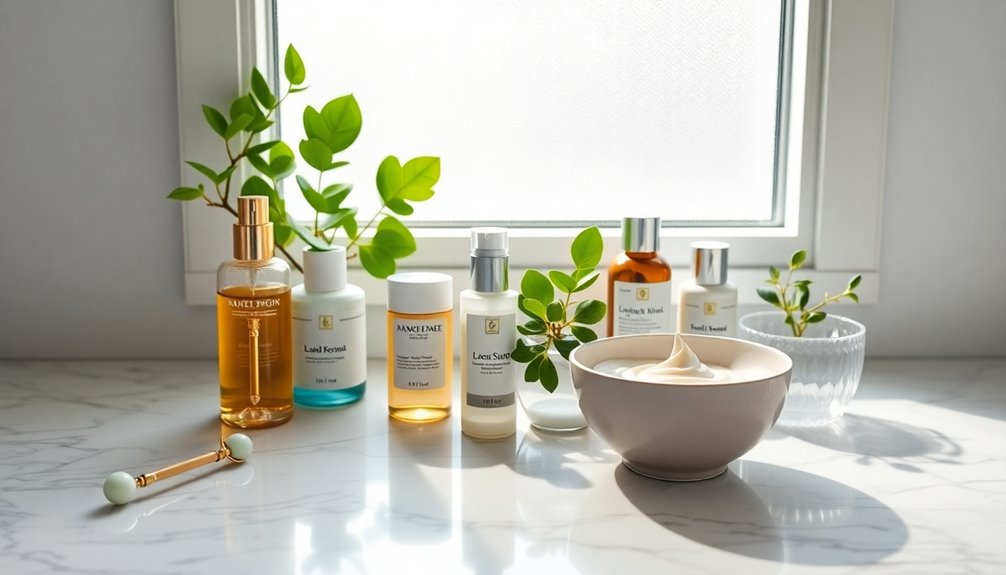
While a basic skincare routine lays the foundation for healthy skin, adding targeted treatments can elevate your regimen to address specific concerns effectively.
Here are three ways to boost your routine:
- Serums: Incorporate serums like vitamin C for brightening or hyaluronic acid for intense hydration, targeting specific skin needs.
- Spot Treatments: Use spot treatments with salicylic acid or benzoyl peroxide to tackle blemishes directly, minimizing the impact on surrounding skin.
- Face Masks and Overnight Masks: Add face masks for concentrated benefits—clay masks for oily skin or hydrating masks for dryness.
Overnight masks can also provide deep hydration while you sleep.
These additional steps can enhance your skincare routine, helping you achieve your desired complexion.
Building Your Skincare Routine

Building a skincare routine starts with the basics, which are key to achieving healthy skin. Begin with a cleanser, moisturizer, and broad-spectrum sunscreen. These essential products lay the foundation for your routine. Gradually introduce other items like toners and serums to address specific skin concerns.
| Product | Purpose | Example |
|---|---|---|
| Cleanser | Remove impurities | Gentle foaming gel |
| Moisturizer | Hydrate and protect skin | Lightweight lotion |
| Sunscreen | Shield from UV rays | Broad-spectrum SPF 30 |
Stick to your routine for 4-6 weeks, and keep a skincare journal to track your progress. This will help you refine your routine based on your skin's reactions to basic formulations.
Start Simple
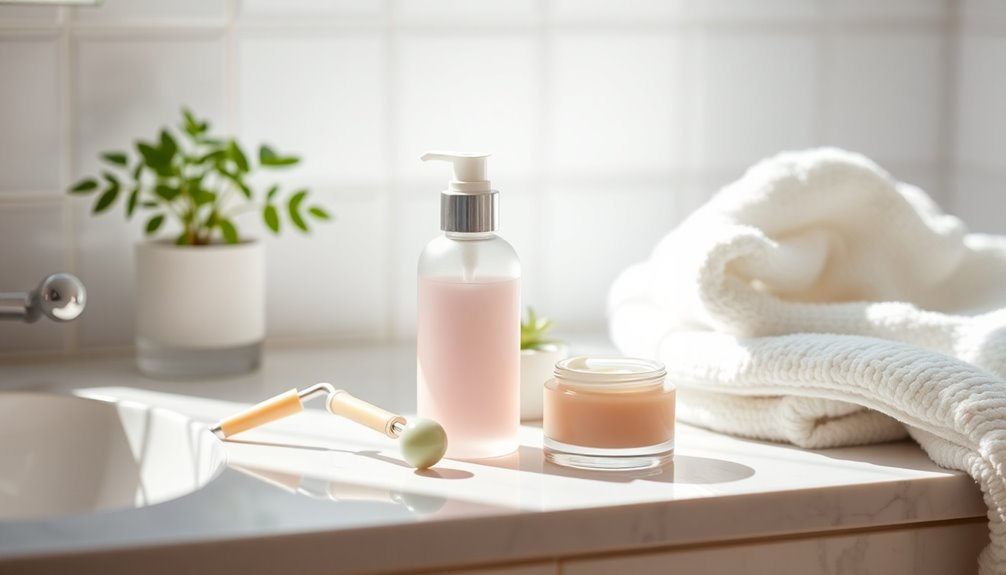
Starting your skincare journey can feel overwhelming, but keeping it simple is key.
Begin with a basic skincare routine that focuses on essentials. Here's what you need:
- Gentle cleanser: Cleanse your face twice daily to remove dirt and impurities.
- Moisturizer: Apply a good moisturizer right after cleansing to hydrate your skin.
- Broad-spectrum sunscreen: Protect your skin every morning from UV damage.
Stick to this routine for at least 4-6 weeks to see how your skin responds.
Avoid overwhelming your skin with additional products initially; get comfortable with these basics first.
Once you feel settled, you can gradually introduce toners or serums.
Be Consistent
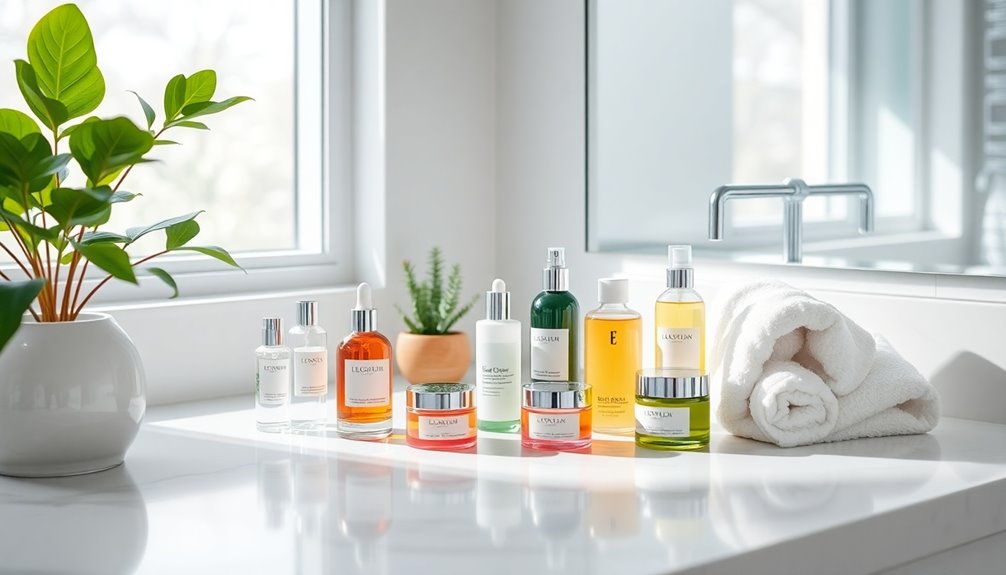
Once you've established a simple skincare routine, sticking to it's key for seeing real results.
Consistency is essential; it often takes 4-6 weeks to truly assess the effectiveness of your products. By maintaining a daily regimen, you reinforce healthy skin habits and give active ingredients time to work.
To improve adherence, set reminders or choose a specific time each day for your skincare routine. Avoid frequently changing products, as this can lead to confusion and irritation, making it harder to determine what works for you.
Consider keeping a skincare journal to track the effectiveness of your products and any changes in your skin over time. This will help you make informed adjustments to achieve the best results.
Seek Professional Advice
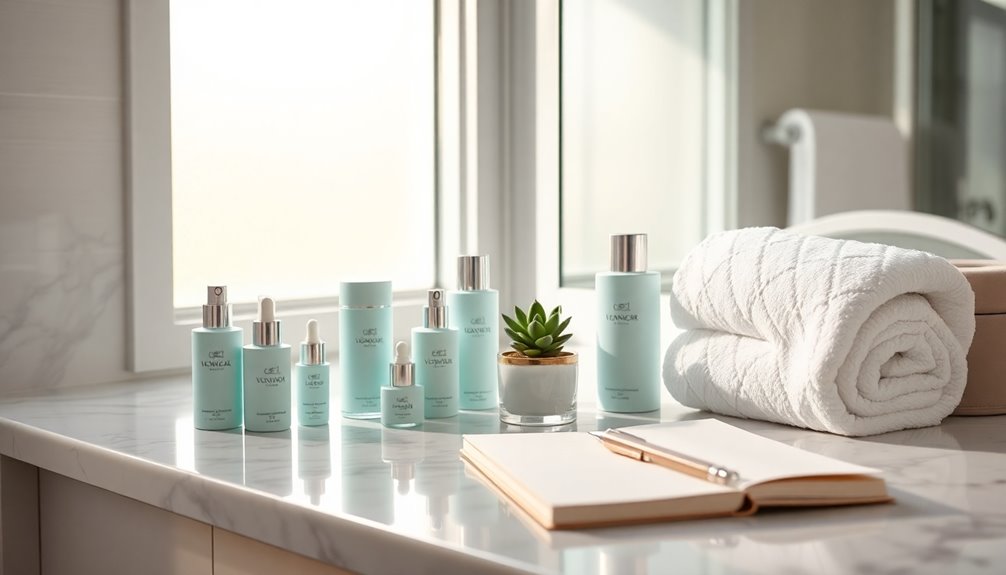
Although you might feel confident in your skincare choices, seeking professional advice can elevate your routine considerably. Consulting a skincare expert can provide you with:
Seeking professional skincare advice can significantly enhance your routine and address your unique skin concerns effectively.
- Personalized Recommendations: Tailored to your unique skin type and concerns.
- Targeted Treatments: Help identify specific skin issues like acne or sensitivity, guaranteeing effective solutions.
- Latest Insights: Stay updated on new products and techniques, enhancing your routine's effectiveness.
Booking a session with a skincare consultant allows for early intervention, preventing long-term skin problems.
Regular follow-ups guarantee you track progress and adjust your routine as your skin needs change.
Frequently Asked Questions
What Is the Best Skin Care Routine for Beginners?
The best skincare routine for beginners starts with cleansing your skin to remove impurities.
Next, use a toner to balance your skin's pH and prepare it for further products.
After that, apply a serum tailored to your skin's needs.
Follow up with a lightweight moisturizer to lock in hydration.
Finally, don't skip sunscreen during the day; it protects your skin from UV damage.
Stick to these steps for a solid foundation!
What Is the 4 2 4 Rule in Skincare?
The 4 2 4 rule in skincare involves a two-step cleansing process.
First, you spend 4 minutes using an oil cleanser to break down makeup and impurities.
Then, you follow it with 2 minutes of a water-based cleanser to wash away any leftover debris.
This method helps maintain your skin's moisture barrier, preventing dryness while ensuring a thorough cleanse.
It's especially great for oily or acne-prone skin, enhancing product absorption and improving texture.
What Are the 4 Basic Skincare Routines?
Think of your skin as a canvas; to create a masterpiece, you need a solid foundation.
The four basic skincare routines are cleansing, toning, moisturizing, and applying sunscreen. You start by cleansing to remove impurities, then tone to balance your skin's pH.
Next, you lock in hydration with a moisturizer, and finally, you shield your skin from UV damage with sunscreen.
Following these steps keeps your skin healthy and radiant every day.
What Are the 7 Steps of a Skincare Routine?
A complete skincare routine consists of seven essential steps.
First, you'll cleanse your skin to remove dirt and oil.
Next, toning balances your skin's pH.
Then, exfoliate 1-2 times a week to eliminate dead skin cells.
After that, treat any specific concerns with targeted products.
Moisturizing follows to lock in hydration, and don't forget sunscreen to protect against UV damage.
Finally, you can use additional treatments as needed for your skin's unique needs.
Conclusion
Now that you've got the essentials down, it's time to embrace your skincare journey with confidence. Just like a garden needs care to bloom, your skin thrives on consistency and the right products. Remember, it's okay to start simple and gradually build your routine. If you ever feel lost in the maze of skincare, don't hesitate to seek professional advice. Your skin deserves the best, and with patience, it'll reflect the beauty you nurture within.



